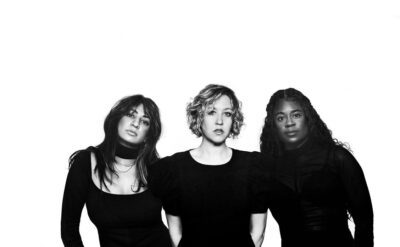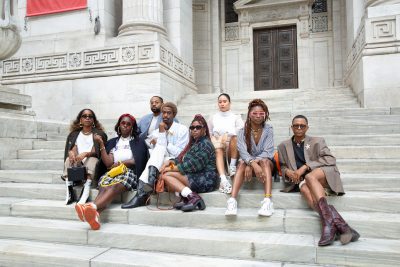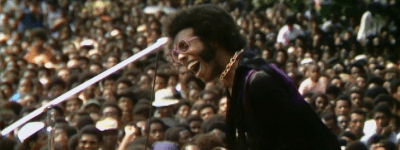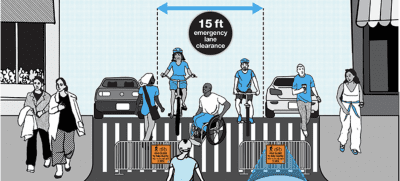Interview with 2018 NBCC Non-Fiction Award Finalist Kapka Kassabova
For the past four years, the National Book Critics Circle has partnered with The New School’s MFA Creative Writing program, allowing the students to interview each of the NBCC Awards Finalists. In addition to building excitement for the Awards Finalist Reading and Ceremony held at the New School March 14th-15th, these interviews have built an intergenerational bridge between the writers of today and tomorrow.
This year, as part of the ongoing collaboration, and in support of the NBCC’s conversation about reading, criticism, and literature that extends from the local to the national, Brooklyn Magazine will publish and promote the interviews between NBCC Finalists and the current students of The New School.

Having left as a young woman after the fall of the Berlin Wall, Kapka Kassabova paints an epic portrait of her return journey to her native Bulgaria. There, she rediscovers the resilient border world of her childhood and the myths, ghosts, and those that continue to inhabit and cross it. Border: A Journey to the Edge of Europe (Graywolf) plunges us into the heart of our search for and belief in identity. Poet and travel writer, Kassabova infuses her storytelling with the region’s ancient mysteries, so at any juncture we wonder if we haven’t stumbled into a mythical, parallel universe where what was once thought departed, is alive and eternally present.
Along the way, we meet the border people, hear their tragedies and triumphs, and discover their paradoxical relationship with the dubious boundary that separates them. This is a story for our times told through the region’s haunting narratives and entrenched identities that at every turn of phrase whisper a lesson from the past.
The border of Bulgaria, Greece, and Turkey has been at the center of world news owing to the large migrant influx. The region is a personal place for you. Did you feel an urgency to write this story now?
That border has cast a shadow over me my whole life, really—because I grew up behind it. I grew up with the question: Why can’t we cross the border? Why can’t we go to Greece and Turkey, or anywhere else for that matter? Why are we living inside an open-air prison? It was a healthy question to which there was no healthy answer. That border was where The Iron Curtain stopped being a metaphor and acquired a physical body. I always knew I was going to write about it, and my border journey began in 2013, before the refugee crisis. My writer’s instinct told me the time had come.
Border is your personal homecoming story, a literary tradition dating back to the Greeks. In the book you write, “Perhaps the story of all our lives is the story of what is lost and how we go about looking for it.” What were your expectations and did you find what you were looking for?
It’s important to have no expectations as such. Though of course I was looking for narrative gold, and I found it. But I was also looking for meaning and truth, both personal and collective—a point of meaningful contact with the past, present, and future. The border zone, in all three countries, is a desperately plundered place, but I found it rich in meaning and symbolism. It’s a place of universal truths.
The book’s subtitle, A Journey to the Edge of Europe, connotes the blurred geographical and historical border of Europe and, perhaps more importantly, its psychological, ethical “edge,” where its foundational myths, nightmares, and hope converge. What were your thoughts in choosing the word ‘edge’ and does it match what you encountered?
Yes—and the border itself is an edge. I was mindful that Europe, before it was defined as a polity or even as a continent, was a vague notion. I love this line from Herodotus: “With Europe. . . no one has ever determined whether or not there is sea either to the east or to the north of it.” But the area of my border has always been a confluence of continental currents, before Europe and Asia came to be differentiated. But especially after. There is also the added edge-of-reason dimension, the haunted dimension of this border zone as a place of natural wilderness, buried secrets and stifled screams—not just from the Cold War, but going back to all the previous wars and forced migrations of peoples. This atmosphere is tangible even to the casual visitor, I think.
The fall of the Berlin Wall ended an era. Many stories from that period of “twilight totalitarianism,” as you call it, seem forgotten. When once people evoked the heartbreaking stories of the border, today many are nostalgic for the Cold War. How did you balance your own nostalgia for childhood with life in the region as you encountered it? Do inhabitants still feel abandoned and long for the days of socialism or Ottoman rule?
Like all peripheral places, the border has its resourceful individuals. I met people dedicated to something they love, however small or unfashionable. These keepers of forgotten things inspired me and I feel we can learn from them. They had nothing, but were rich in some ways.
Nostalgia, however, is a dangerous emotion and it can become malignant when stoked by manipulative politicians. I don’t suffer from nostalgia, it’s grief and anger I felt, and determination to get these stories heard. As you say, ostalgia—nostalgia for the ‘East,’ a German term—is now rife in the former communist bloc. It’s the deprivation and neglect that has afflicted people in the border area (and elsewhere) that make them long for that which is irrevocably gone. But above all, people long for a sense of future.
When the vision of a possible future is taken away from you by a succession of kleptocracies, as has been the case in Bulgaria (Turkey and Greece have their own dramas too), all you have is the past. This is something we are seeing across the world today, including in Britain and the United States—a harking back to the certainty of some imaginary national golden era. It’s important to stress ‘imaginary.’ When the collective imagination can’t project itself forward, it projects backwards. This is also the problem of dying villages, of communities left behind, while cities and centers of power prosper. This is increasingly a focus of interest for me.
In Border, you point out how nationalism, communism, and fascism have all been a scourge in Bulgaria, Greece, Turkey and the broader region, destroying communities, separating families, and alienating individuals. What is the future of interethnic and interreligious cohabitation in the region?
How to summarize an enormously complicated region? The future of the Balkans depends on whether its various nations can work together towards a common future. For that to happen, they need to feel positively empowered as societies but also at the community level. If they can’t, if they feel disempowered, voiceless, left behind, and fall prey to cynical demagogues, another war is possible in the region. But I want to be optimistic. The region has huge natural resources—water for instance—and a unique, shared culture.
Where there is an assault on hope, there is an assault on nature and vice versa. I saw flagrant instances of this in remote parts of Turkey, Bulgaria, Greece, and more recently—Macedonia and Albania. This is perhaps the biggest suicidal risk in the region, but also worldwide. To hack into a sacred mountain is like hacking off your own legs.
The migrant and refugee crisis that has emerged in the wake of the Arab Spring and the conflict in Syria has had a direct impact on the region and Europe. The greatest influx occurred after writing your book, but you describe those first migrants in ghostly terms. How will the migrant crisis ultimately affect your homeland and the region as a whole?
Ghostly is how the refugees look to the locals—like apparitions from their own ancestral past of forced migration across this border. Many border people are descendants of refugees from a hundred years ago. They are also afraid of the refugee as ‘the other,’ who merges with the painful ancestral memory. But there is also a sense, in Bulgaria and Greece, that as these refugees from the East (and of Islam), enter their space, history moves backwards—into the Ottoman, un-European past that took so long to shake off. There is a fear of regression—unfounded, but real. One shepherd in an empty Turkish border village said to me: “All these Syrian families passing through, and all I need is one family to move into one of the empty houses, help me with the flock, get the community going again.”
But literature (and the arts) is often viewed as a means to breaking down barriers (and borders) that allows people of different backgrounds to understand each other. How do you see your book, Border, within that tradition?
Border reaffirmed my sense that my obsession—but also one of the subjects of our times—is tyranny and freedom. Since childhood, I have sensed the presence of tyranny at every level, and thirsted for freedom. My mission as a writer is therefore humanist. Franz Kafka’s metaphor of literature being the axe that “breaks the frozen sea within us” is a forceful one, but I like to think that books can do that. They do it for me.
Ancient mysteries and superstitions are an integral part of your story. Those mysteries coincide with the mountainous border region of Strandja, making it a place where the sacred and the profane interact. It reminds me of Mircea Eliade, whom you quote, about how, for the religious/spiritual individual, there is a divide between sacred and profane space. Was this an idea you understood, or did it come to you through your journey in writing the book?
Well, we all have a subconscious understanding of ritual and nature’s cycles—it comes from the collective unconscious; the domain of ancestral knowledge. These phenomena only made it into the book once I came across them. It wasn’t pre-planned. Then it was clear to me that unless I embraced them into the wider, more intellect-driven narrative, I could not be true to the spirit of the place and its people. As a poet, I’m always on the lookout for symbols and patterns to transcend the immediate information of the material world. The border zone was a treasure trove in that sense, especially Strandja, which does have an omphalos-like quality.
Border is a book of ideas that, over time, have morphed into foundational myths and ideologies; all of which possess truth and inviolability for the region’s people and communities. Each chapter is prefaced by an idea/concept that serves as the common thread. How did you arrive at the structure of the book?
Instinctively. But from the start, I was aware that the material was going to have a narrative density and a polyphonic quality that would have to be somehow accommodated and acknowledged in the book’s structure. I had already done something similarly alchemical with my previous book, Twelve Minutes of Love, which is about the Argentinian tango, the music of exile and emigration. Like the ethnographic realms of Border, the world of tango rests on concepts that come from cultures other than the Anglophone one—like tanguidad or cabezeo. I had to find a way to render these concepts.
You grew up in Bulgaria, the edge of Europe, in a country and region defined by borders. But you’ve chosen to live in what you call, “a borderless country,” Scotland. Has your journey writing Border changed how you view your home? Would you return? Or is borderless Scotland more appealing now?
Scotland is my beloved home, where I feel free. It is an island that has always tried to connect with the European mainland and the world. But—to paraphrase the Argentinian writer Andrew Graham-Yooll speaking of Buenos Aires: my love and my anger remain in the Balkans. Because the Balkans are still self-tyrannized yet also alive with wondrous potential.
The final chapter, “How to Lift a Spell,” ends with a note of hope and caution for the region, for humanity and for the earth. Your write meaningfully, “We arrive naked and depart with empty hands.” It took a lifetime to write Border, it seems. Where do you go from here?
Yes, and my new book also feels as if it’s taken a lifetime. It’s a psycho-geographic quest around two ancient lakes in Macedonia and Albania. My maternal line began there. The lake is a feminine symbol of connectedness, but once again, I came across borders. So I continue to explore tyranny and freedom, but this time through our common ancestral matrix and its imprints in the land.
You might also like 


























